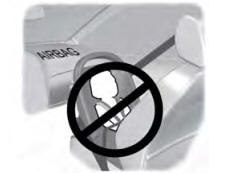Ford Explorer: Driving Hints / Economical Driving
Ford Explorer 2020-2025 Owners Manual / Driving Hints / Economical Driving
Fuel economy is affected by several things such as how you drive, the conditions you drive under and how you maintain your vehicle.
You may improve your fuel economy by keeping these things in mind:
- Accelerate and slow down in a smooth, moderate fashion.
- Drive at steady speeds.
- Anticipate stops; slowing down may eliminate the need to stop.
- Combine errands and minimize stop-and-go driving.
- Close the windows for high-speed driving.
- Drive at reasonable speeds (traveling at 55 mph (88 km/h) uses 15% less fuel than traveling at 65 mph (105 km/h)).
- Keep the tires properly inflated and use only the recommended size.
- Use the recommended engine oil.
- Perform all regularly scheduled maintenance.
Avoid these actions; they reduce your fuel economy:
- Sudden accelerations or hard accelerations.
- Revving the engine before switching it off.
- Idle for periods longer than one minute.
- Warm up your vehicle on cold mornings.
- Use the air conditioner or front defroster.
- Use the speed control in hilly terrain.
- Rest your foot on the brake pedal while driving.
- Drive a heavily loaded vehicle or tow a trailer.
- Carry unnecessary weight (approximately 1 mpg [0.4 km/L] is lost for every 395 lb (180 kg) of weight carried).
- Driving with the wheels out of alignment.
Conditions
- Heavily loading a vehicle or towing a trailer may reduce fuel economy at any speed.
- Adding certain accessories to your vehicle (for example bug deflectors, rollbars, light bars, running boards, ski racks or luggage racks) may reduce fuel economy.
- To maximize the fuel economy, drive with the tonneau cover installed (if equipped).
- Using fuel blended with alcohol may lower fuel economy.
- Fuel economy may decrease with lower temperatures during the first 5–10 mi (12–16 km) of driving.
- Driving on flat terrain offers improved fuel economy as compared to driving on hilly terrain.
- Transmissions give their best fuel economy when operated in the top cruise gear and with steady pressure on the gas pedal.
- Four-wheel-drive operation (if equipped) is less fuel efficient than two-wheel-drive operation.
- Close the windows for high-speed driving.
 Breaking-In & Reduced Engine Performance
Breaking-In & Reduced Engine Performance
Breaking-In
You need to break in new tires for approximately 300 mi (480 km). During this
time, your vehicle may exhibit some unusual driving characteristics...
 Cold Weather Precautions & Driving Through Water
Cold Weather Precautions & Driving Through Water
Cold Weather Precautions
The functional operation of some components and systems can be affected at temperatures
below -13°F (-25°C).
Driving Through Water
WARNING: Do not drive through flowing..
Other information:
Ford Explorer 2020-2025 Service Manual: General Procedures - Fuel System Pressure Check
Special Tool(s) / General Equipment 310-D009 (D95L-7211-A) Fuel Pressure Test Kit Check NOTE: This Fuel System Pressure Check is for the low pressure side of the system. Release the fuel system pressure. Refer to: Fuel System Pressure Release (310-00A Fuel System - General Information - 2...
Ford Explorer 2020-2025 Service Manual: General Procedures - Individual Flash Pattern Programming
Programming All vehicles WARNING: Police Package warning lights are a high-intensity Light-Emitting Diode (LED) type. Do not stare directly at these lights, as doing so may cause temporary blindness and/or eye damage. Failure to follow this instruction may result in personal injury...
Categories
- Manuals Home
- 6th Generation Explorer Owners Manual
- 6th Generation Explorer Service Manual
- Fuel Filler Funnel Location & Running Out of Fuel
- Engine
- Body and Paint
- New on site
- Most important about car
Children and Airbags
WARNING: Airbags can kill or injure a child in a child restraint. Never place a rear-facing child restraint in front of an active airbag. If you must use a forward-facing child restraint in the front seat, move the seat upon which the child restraint is installed all the way back.

Copyright © 2025 www.foexplorer.com
